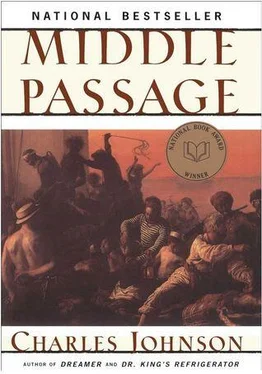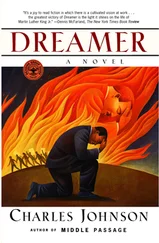It was then my hair started going white. Unable to watch, I repaired to sit alone in the cookroom, my head in my hands and back against an oven of such antiquity it was usually hotter on one side than the other, so that Squibb’s tipsycakes (so called since he laced them with rum) rose crooked and once they were frosted the top layer would gradually slide off. Clearly, nothing on the Republic was as it should be, but it behooves me for the sake of my own character, shabby as this is, to explain how murderous my thoughts became after taking part in the captivity of the Allmuseri. I wondered if the blacks who’d traveled with Balboa and Cortez hated their leaders as much as I did Ebenezer Falcon, if Estéban, the legendary explorer from Morocco, felt as cool toward his companions, three Spanish officers, as I sometimes did toward Cringle, who would never in this life see himself, his own blighted history, in the slaves we intended to sell, or wonder, as I did, how in God’s name I could go on after this? How could I feel whole after seeing it? How could I tell my children of it without placing a curse on them forever? How could I even dare to have children in a world so senseless? How could. .
“Mr. Calhoun?”
“Here, sir.”
“There’s one hour till daylight.” Falcon stuck his head into the hatchway. “I’ve new orders for you.”
I stood, brushing off the seat of my trousers. “Sir?”
“We’re about to weigh anchor. You’re in charge of feeding the Africans in messes of ten at nine in the morning and four, and give ’em half a pint of water three times a day. Squibb handles the crew as before, but no one is to feed the new cargo, or come near it, except me.”
“No? Might I ask what it eats?”
“Don’t ask,” says he. “Nothin’ from your supplies, so you needn’t worry.”
That, of course, was a lie.
There was plenty of reason for worry. Captain Falcon revealed to no one the contents of the mysterious crate brought by raft and lowered below by Bogha’s servants into a storeroom behind the stemson through a hole cut into the deckbeams, then boarded over. Ere the skipper brought the Republic about and headed out to sea, a few of the crew, myself among them, wagered five bob on what his find might be. Squibb claimed it was the Missing Link between man and monkey; Cringle said it was most probably a nearly extinct lizard, maybe intelligent, that would have scholars from Cambridge to Queen’s College rewriting natural history; and Meadows, to frighten us all, reported that he had heard someone at the fort say it had fallen from the sky near the Allmuseri villages, which whilom were tucked away in the bush between Cape Lopez and the Congo River and had been protected by them for centuries. We drew lots to see who would be the first to sneak below while the captain slept and wrench open a plank to peer inside. Tommy O’Toole, the cabin boy, pulled the shortest length of string. He shinnied down a rope reef-knotted round his waist so we could pull him up. After ten minutes Squibb tugged and found the rope broken. We were about to lower him when the boy crawled back on deck with only half his mind — or could be it was twice the mind he had had before. His skin was cold, all one bluish color as if he had been baptized in the Deep. His face was blank as a pan. And his words, as his mouth spread and closed like a fish’s, were strange: a slabber of Bantu patois, Bushman, Cushitic, and Sudanic tongues, and your guess where he learned them is as good as mine. His eyes glowed like deck lights, less solid orbs of color, if you saw them up close, than splinters of luciferin indigo that, like an emulsion, had caught the camphor of a blaze once before them.
With Cringle’s waistcoat shawled over his shoulders for warmth, and holding a horn of rum in his hands, he found a space in his sporadic madness to tell how he’d come within three feet of forcing open a door in the crate after the rope broke but was stopped by the density of air around it, a natural defense of the thing inside, which did not so much occupy a place as it bent space and time around itself like a greatcoat. He could force his bare feet to go no farther. This was just as well, for dark coils of the creature’s defecation were everywhere, slithering with insects, worms, and sluglike beings that apparently lived inside its bowels. All at once, the crate rocked gently as something crab-walked from one side of the box to the other, scritching its nails on the walls, muttering to itself like a devil chained inside a mountain for a thousand years, its voice gently syllabled and honeyed, as sacramental as a siren’s, or peradventure its very breathing was a chant so full of love and werelight, vatic lament and Vedic sorrow, that the boy’s heart bade him listen more. He slapped his left hand over his mouth, clamped his right hand over the left, and bent down on one knee, this being a brain-rinsing song the boy somehow felt he knew. Down in that lichened chamber, down in this shrunken air scattered with galleywood and bosun’s stores, down in a vault swimming with imponderables, he forgot where he was and why he had come: a sea change nicer than any of us knew, he said; and then the creature’s lay whistled from his own lips like the sweetest of fluids whelming through his windpipes, and he was inside the luminous darkness of the crate, himself chained now yet somehow unchained from all else, sadly watching young Tommy O’Toole, sensing as if through the lotic skin of a stingray or crab, and they were a single thing: singer, listener, and song, light spilling into light, the boundaries of inside and outside, here and there, today and tomorrow, obliterated as in the penetralia of the densest stars, or at the farthest hem of Heaven.
When he had finished, his eyes ashimmer after peering into the heart of things hidden and his body swaying to music none but he could hear — after this, there was no sound forward and aft except the creaking of rigging loud as a bonfire. “Blimey.” A deck hand ran his fingers through his hair. “It eats people, that’s what it eats.” Squibb was tight as usual, trying to stand erect, weaving on both feet, tilting first left, then right. He lifted the cross from his neck and, his eyes closed, kissed it. “Saints preserve us.” A few chaps shivered, and not simply from the wind’s chill gnawing through our coats. All could see the ship’s boy would never come about. He was lost to us.
“You can belay that kind of talk,” said Cringle, buttoning his coat up on the boy. “I take it you’ve work to do, so be at it. Prompt, if you please.” His arm waisting Tommy, Cringle assured him he would come to no harm. He promised to erase his name from the work roster and, being the sort of quartermaster given to rising at night to pull back the covers on others who’d kicked them off when sleeping, fearing they might be chilled, he led him to his own berth, which the ship’s boy was to have for the rest of our voyage home.
Entry, the fourth JUNE 28, 1830
Homeward bound on May 30, we left the fort with the Republic leaking like a sieve, hoping again to cross the Flood, but this time with the sides of the ship bloated, scorched by the sun, and with barnacles clotting her stern-piece. She reached the latitude of 20° south, and longitude 10° west, sailing full and by without serious mishap on North Atlantic trade winds until on the fifteenth day the weather turned squally. Pellets of rain hammered the sails so heavily Captain Falcon was obliged to shorten the main topsail and let the ship sail under bare timber. “Nothing for you to worry about,” he told me. “Just see that you and Squibb double-lash the longboats and secure the galley.” But his voice wobbled, and I knew he was not telling me the worst. It was the stormy season of the year off West Africa. And during the bleakest nights when curdling fog rolled in, obscuring the stars and sky, making precise calculations of our position impossible, when the wind wheeled unexpectedly from NW to NNW, twirling us like a matchbox or toy ship of balsa wood — those nights, Falcon and the few men still loyal to him stayed awake through each watch in the skipper’s cabin, sipping coffee laced with rum, crimped foreheads tilted together over maps and compasses spinning widdershins. Younger lighthands lost their appetites. Tommy, relieved of all his duties, couldn’t hold down as much as a sea biscuit, and neither could I, mainly because Squibb and I cooked the slop and I saw him spit into it when he was angry with the crew. Older sailors swore, suddenly got religion (there are no atheists at sea, as they say), and fingered their crosses, whispering prayers for fair weather, and scheming all the time — anyone could see this — on ways to seize the ship and steal her cargo.
Читать дальше












